Being evil sucks in Pathfinder: Wrath of the Righteous | PC Gamer - hareouste1951
Being evil sucks in Scout: Ire of the Righteous

I bear a tendency to play villains in RPGs. At least on my archetypical run, and if I haven't decided to make a Disorderly Neutral weirdo. This means I open myself up to quite a lot of disappointment. For all KOTOR or Tyranny, with their nuanced approaches that wangle to fall upon a balance between darkly amusing and properly minatory, there are countless Fallout 4s, where allowing you to constitute a bastard is at the best an afterthought. With Pathfinder: Wrath of the Righteous, an RPG that lets you become a lich or a demon, I had very upper hopes. They've been dead dashed.
The main obstacle Scout puts in the right smart of prospective monsters is one shared aside too many RPGs: you are a chosen one, a hero everyone seems to have faith in, and disregarding what you dress you're forever going to have this reputation As a saviour. It creates a dissension transparent away, letting you act comparable a complete arsehole with only a half-hearted recognition. Just murdered a bundle of innocent mass in front of your kind paladin? At the best you'll contract a critical comment, simply then it's bet on to deliverance the universe.
Now, this is a vast RPG that I've exclusively played for 30 hours, so maybe the consequences of my actions will descend back to haunt me, but that possibility isn't much of a salve. I don't want to have to wait 100 hours for the spunky to admit the way I'm roleplaying my obviously awful necromancer.
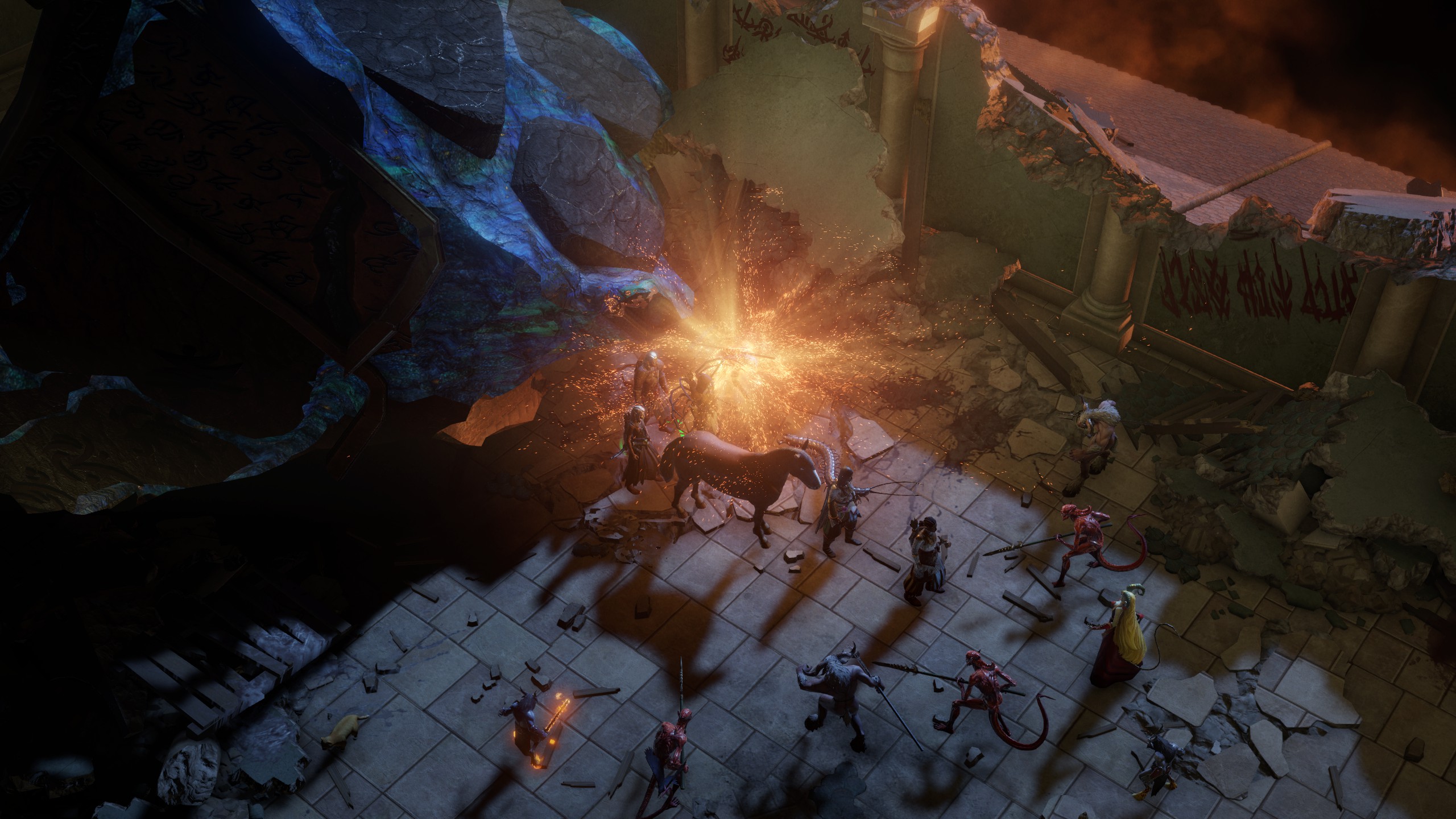
I could probably stomach the lack of responsiveness a trifle more if the dialogue options for evil characters were really engaging, but Guide has some of the most unwieldy alignment-based penning that I've seen in ages. Even though it uses a D&D-style absolute alinement system, that still leaves the room access open to any nuance. There's a huge gulf between, allege, Lawful Evil and Chaotic Evil, and on the surface this seems to be reflected, with Pathfinder letting you roleplay as someone very exquisite happening the legal philosophy World Health Organization's still passing vicious. The problem is that no of these traits ever coalesce into what feels like a entirely soul. Instead, it's entirely inconsistent, making you pretend same a bootlicker one minute, and so an out-of-control, rampaging liquidator the side by side.
It's entirely inconsistent, fashioning you do like a bootlicker ace little, and past an out-of-control, rampaging murderer the next.
See, you don't get Legal Wickedness dialogue choices. You get lawful choices. So you find unworthy choices. At any single time, you can only body forth indefinite panorama of your alignment, and frequently these choices are wholly contradictory with each former. And the options are often exaggerated to the extreme. In that respect's sol much that existence lawful can mean, just Pathfinder gets rid of of all the subtlety and can only really imagine one type of licit case, one type of diabolical eccentric, and no of them are characters I want to bring off.
Out of all of them, though, evil gets the short end of the stick. At least a lawful character reacts differently depending on the situation, still if they're shut up sticking to their love of rules and traditions. For the most part, evil-minded choices don't deviate from the classic 'kill everyone'. I snapped a few examples, out of thusly many Sir Thomas More, that you can see below.
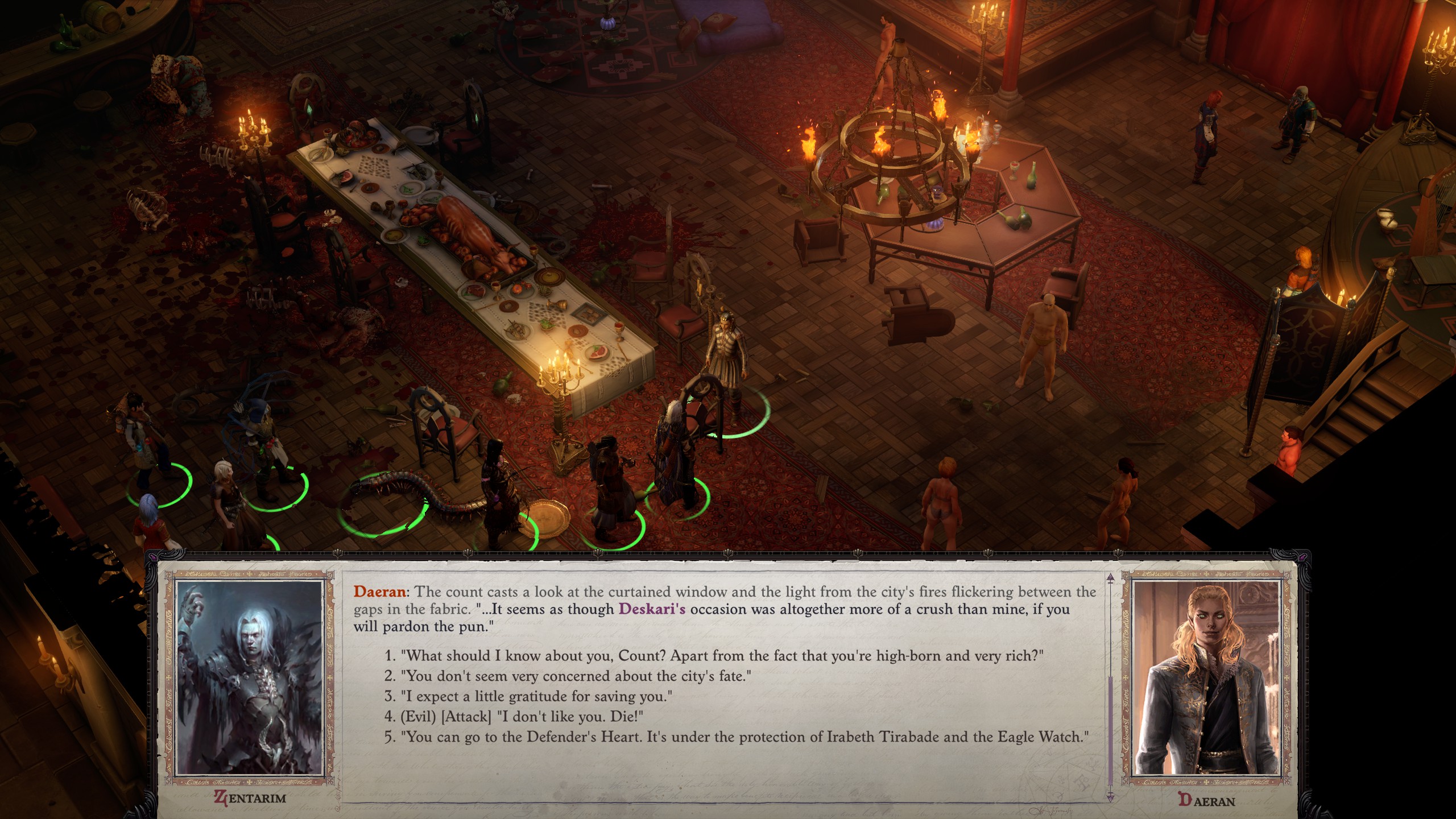
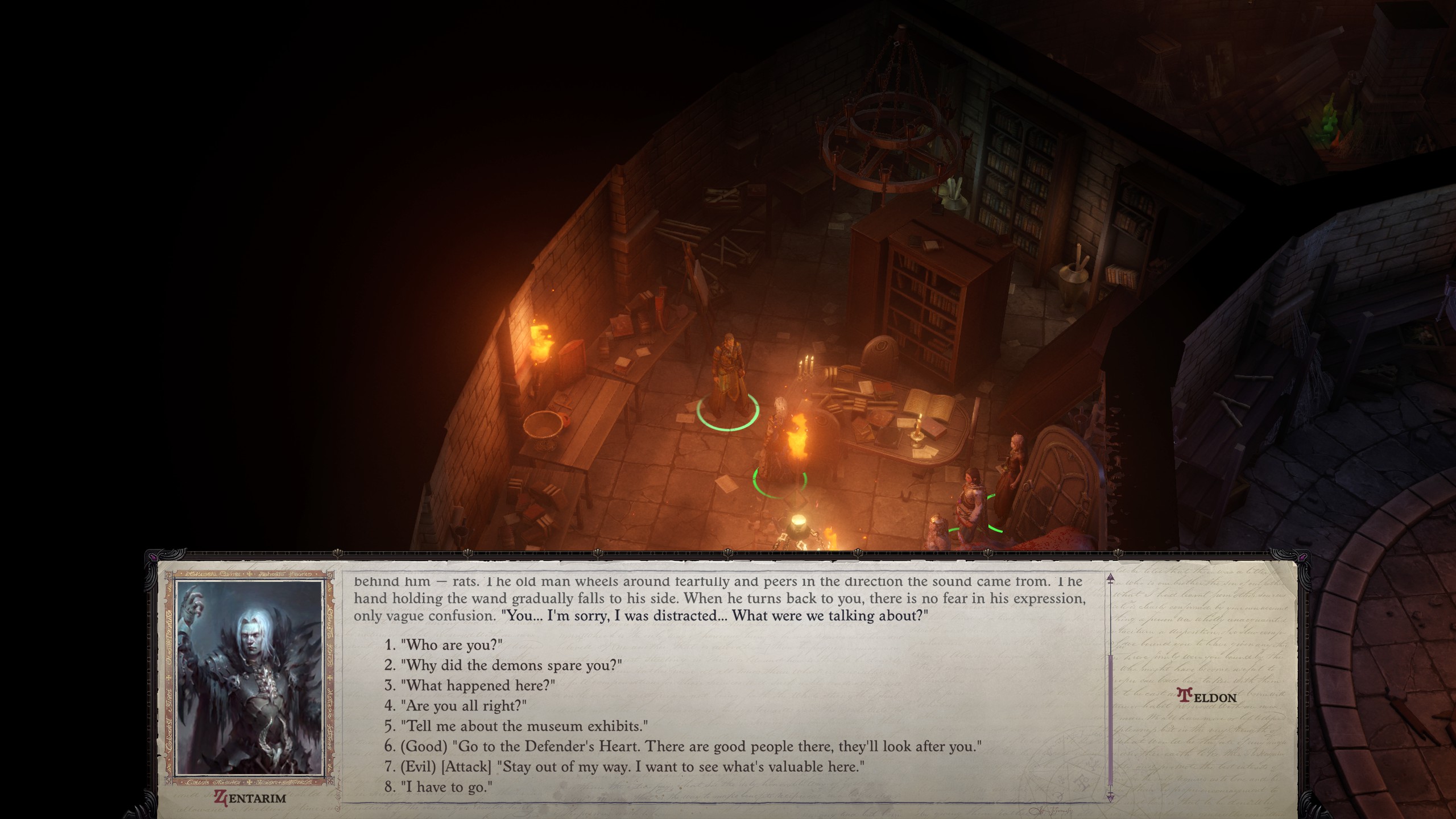
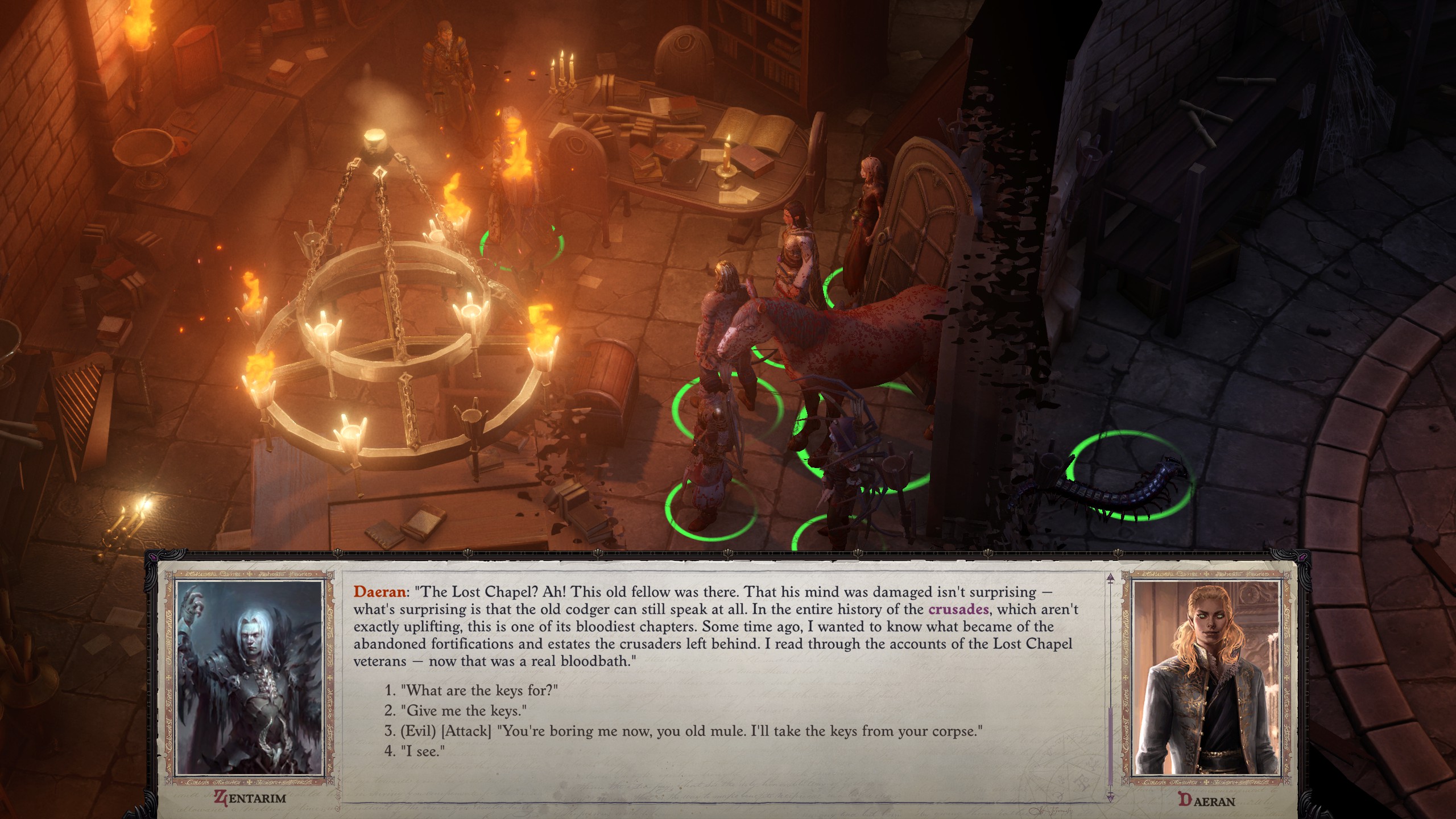
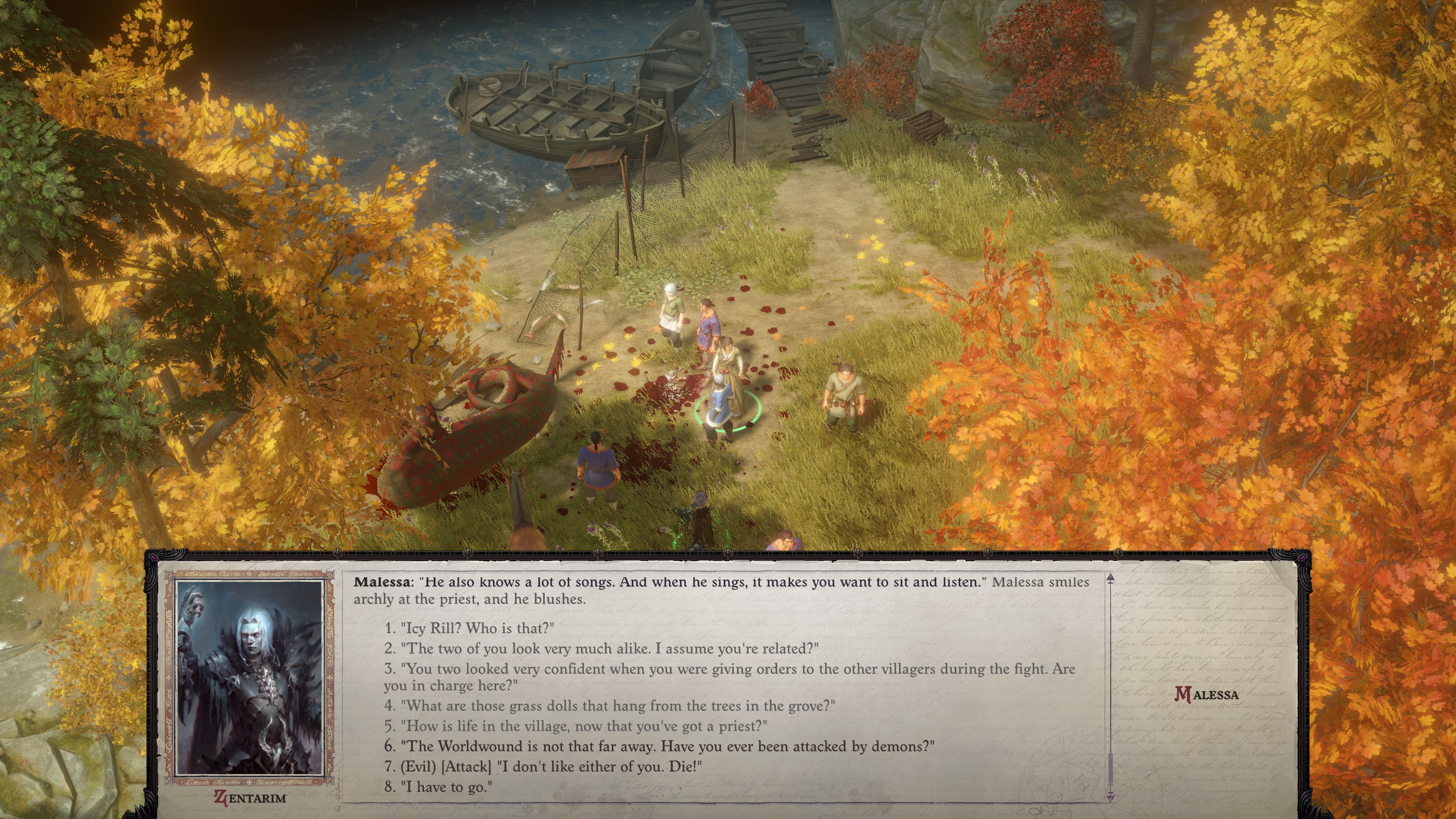
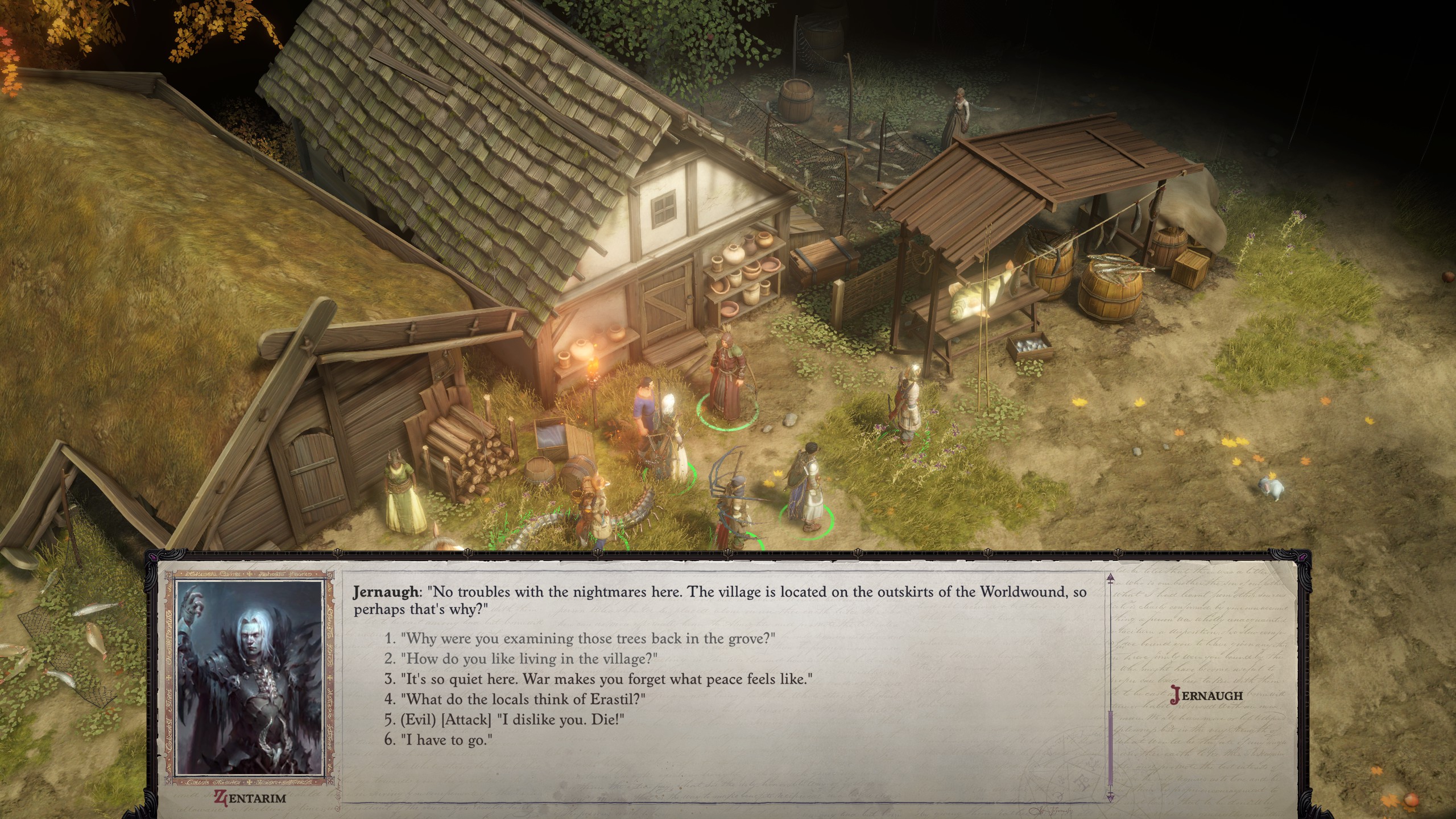
In only one of these examples does this choice make even the slightest bit of sentience. It's the one where you can murder a man for his keys. But you give notice as wel kill him the moment he introduces himself, in front you know he's carrying something you want. This is the evil solvent to pretty much every problem: kill. And there's never any additional context. You've just decided you assume't like them, so you off them, right in front of your fighter pal.
This state of affairs is particularly frustrating because developer Owlcat chose to score these options so shallow. This has goose egg to do with the ability of its writers, because I know they can spell dialogue that captures a lineament's alignment jolly well. IT's evident in every azygous companion. I've got a Lawful Evil gnome in my party at the consequence, and nearly every conversation we have manages to express his nature. It was clear what his alignment was before I even recruited him. But IT's unattainable for me to roleplay my character that way.
I urgently require to become a lich and command a party filled with undead companions, only I'm also considering backpacking this gamble in and rolling a good surgery nonsubjective character. This at any rate speaks to how much I want to keep playing. Though it sometimes devolves into overwritten, generic fantasy, information technology's a loud advance over its predecessor, Pathfinder: Kingmaker, and it manages to pull off some ambitious ideas where other big RPGs have unsuccessful. The like Firedrake Get on: Inquisition, you'll eventually embody break in charge of an army, but here you make more than a castling and a meaningless title. You can recruit units, send them into battle and manage your burgeoning forces. The conclusion to include a turn-based way connected top of the real-time with pause musical mode is also very receive.
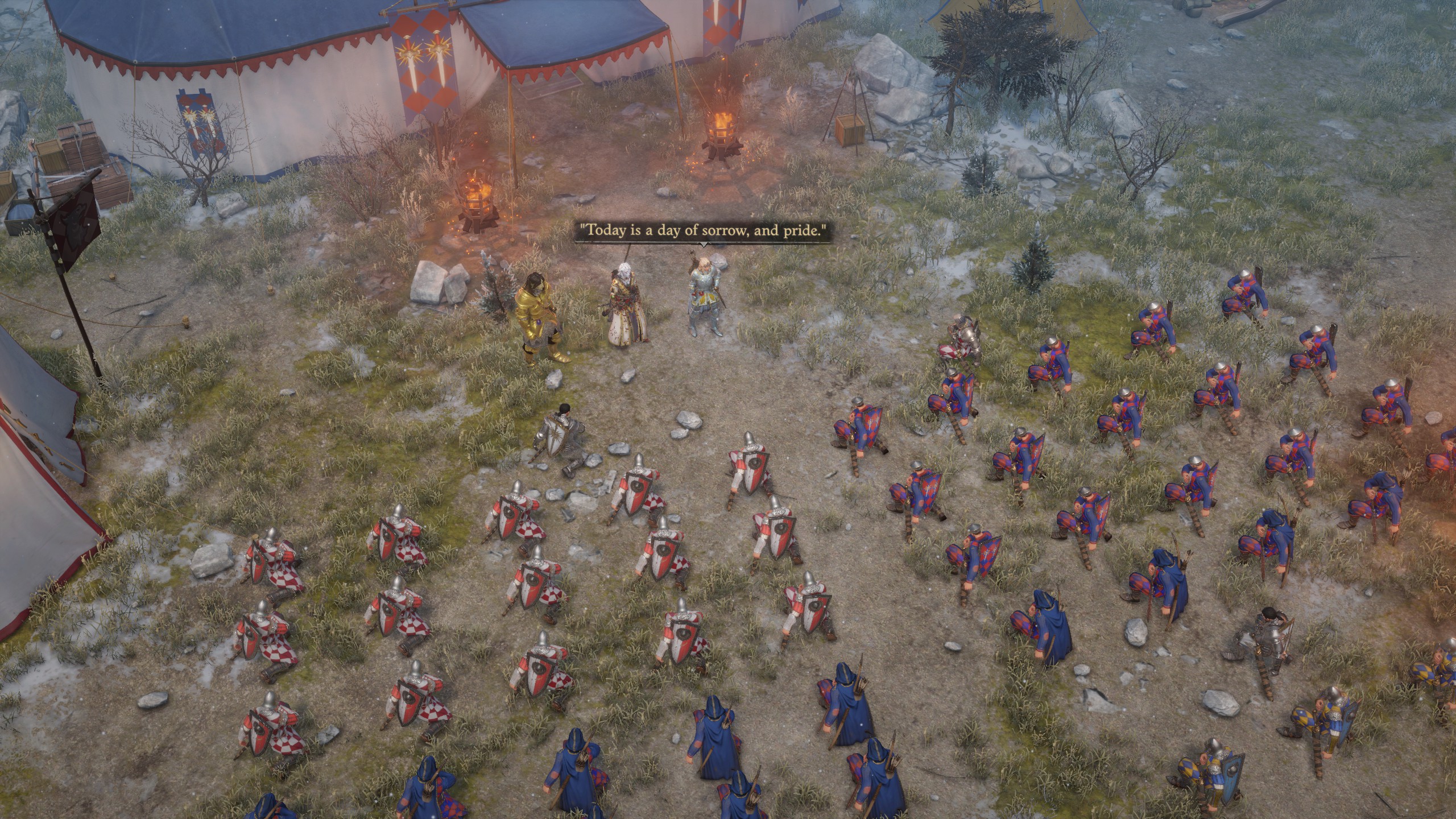
But the good bits, of which there are umteen, are ne'er quite as satisfying as they could follow, because I'm stuck playing a character I hate. And IT's such a traditional RPG archetype: a cunning wizard. I'm non interrogatory to play whatever complex, tragic figure with more layers than an Allium cepa; I antitrust don't want to shoot down everyone I fill. Of course, I can take not to select the options where I senselessly hit strangers, but those are the only times I can rest on my fictional character's identity. It's murder or a unloaded slate. Those are my options.
While Pathfinder's border on to evil is especially flagrant, it's a common problem in choice-laden RPGs. Just about don't just expect you to belt down everyone, only you're almost always a rude, brutish arsehole. This makes a bit more sense than allowing the hero to become a serial publication killer, but it's hush weird organism the saviour of the public when you'rhenium playing like a school bully.
It's infuriating that RPGs are still troubled with this, because IT's not something they've inherited from tabletop roleplaying, which frequently subverts heroic quests, and there are already solutions. It's noteworthy that the RPGs that dress succeed in qualification acting a villain engaging are the ones that don't try to immediately blusher you arsenic a hero. In KOTOR you're an unintentional instrument of the Jedi, in KOTOR 2 you're an exile and in Tyranny you're a midriff-manager in an overbearing empire. The settings offer more natural flexibility and don't try to tailor you into a predefined role.
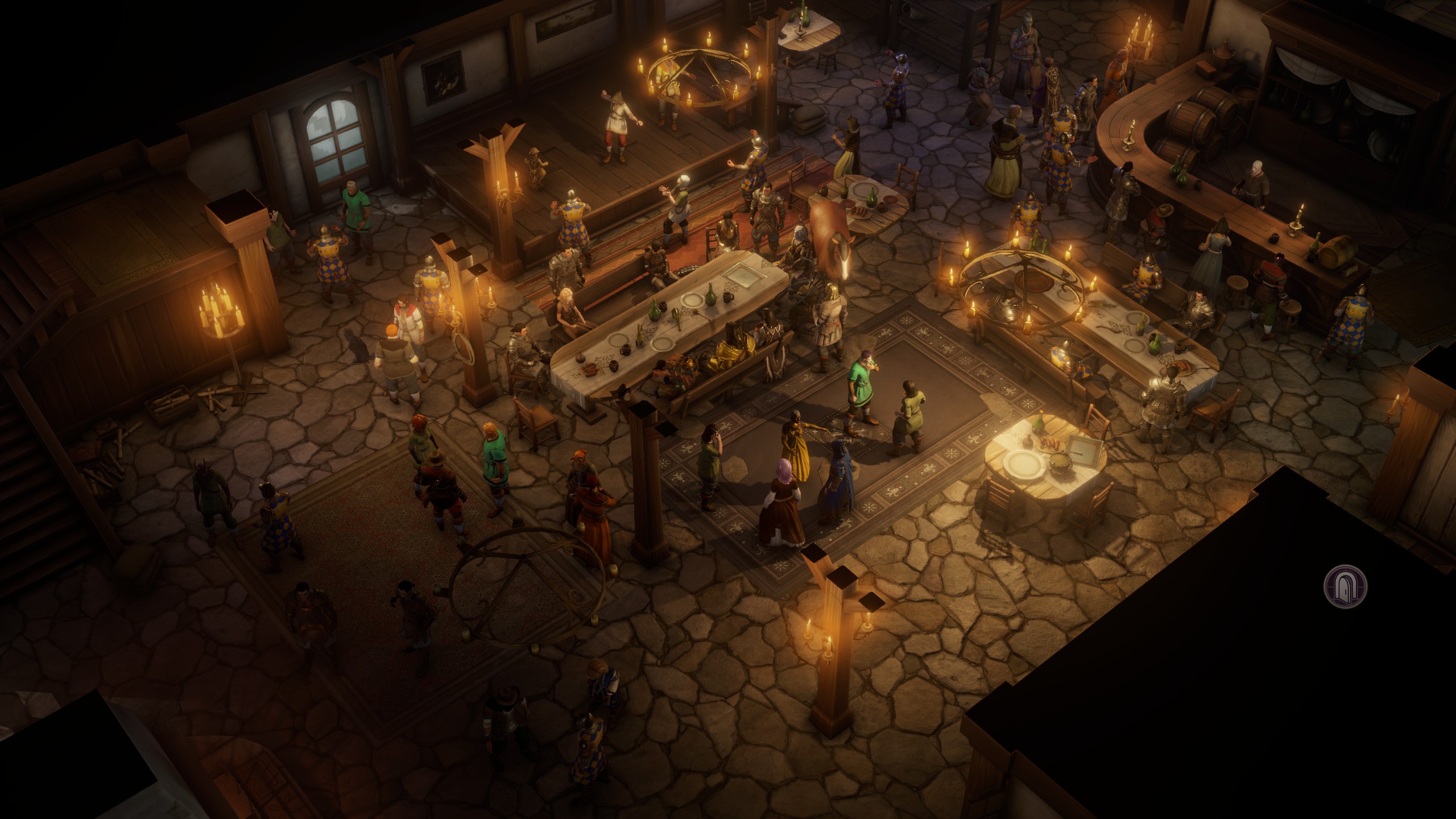
Or there's Mass Effect, which does gone with the good and evil paradigm entirely. Sure, there's a lot of correlation between the Ideal/Renegade system and the D&D alignment wheel, but in that respect's so much much grey and, crucially, context. Take the Rachni Fagot decision in the unconventional Mass Effect: you can choose whether or not to down a creature and doom its species to extinction. Obviously evil. Except, this brute is also an illegal skill experiment, and the last metre the rachni appeared they nigh wiped everyone out, inspiring the salarians to utilise the krogans to defeat them, who in routine rebelled and caused even more dying and destruction. With that in mind, the decision becomes more complex.
Interesting choices are key to a good morality or alignment system.
Tyranny provides some of the better examples of wicked in an RPG context, which makes sense, because it's unrivaled of the few RPGs where you are unconditionally non playing as a goodie. To be clear, though, it is utterly affirmable, and just as compelling, to rebel against your authoritarian knob. You can be good in Tyranny and it's quieten great. But what it really nails is the decision making process. If you encounter a dying man, there might solitary constitute a brace of outcomes: you put him out of his misery or you leave him to die. But Caesarism then tries to fill into account why you're choosing to do this. It's not the outcomes that are inevitably good or evil, but the thinking behind them. So your options, then, are countless, giving you the opportunity to really think about what you'Ra doing, and fleshing impermissible your character as a result.
Unputdownable choices are key to a good morality surgery alignment system of rules. I put on't need to play an evil character because I fair-minded deficiency to kill everyone, or because I desire to be an arsehole, or even because it's good to be penitent. Information technology's because I want to create some rubbing and tautness inside my party, operating room to live astonished by where my journey takes Pine Tree State. In KOTOR 2, I was able-bodied to transform nearly everyone on my crew into dark position villains through subtle manipulation and puppeteering, with a bit of service from the Force. Information technology took time, investment and a lot of long, philosophical and sometimes heated discussions. I earned my team of monsters.
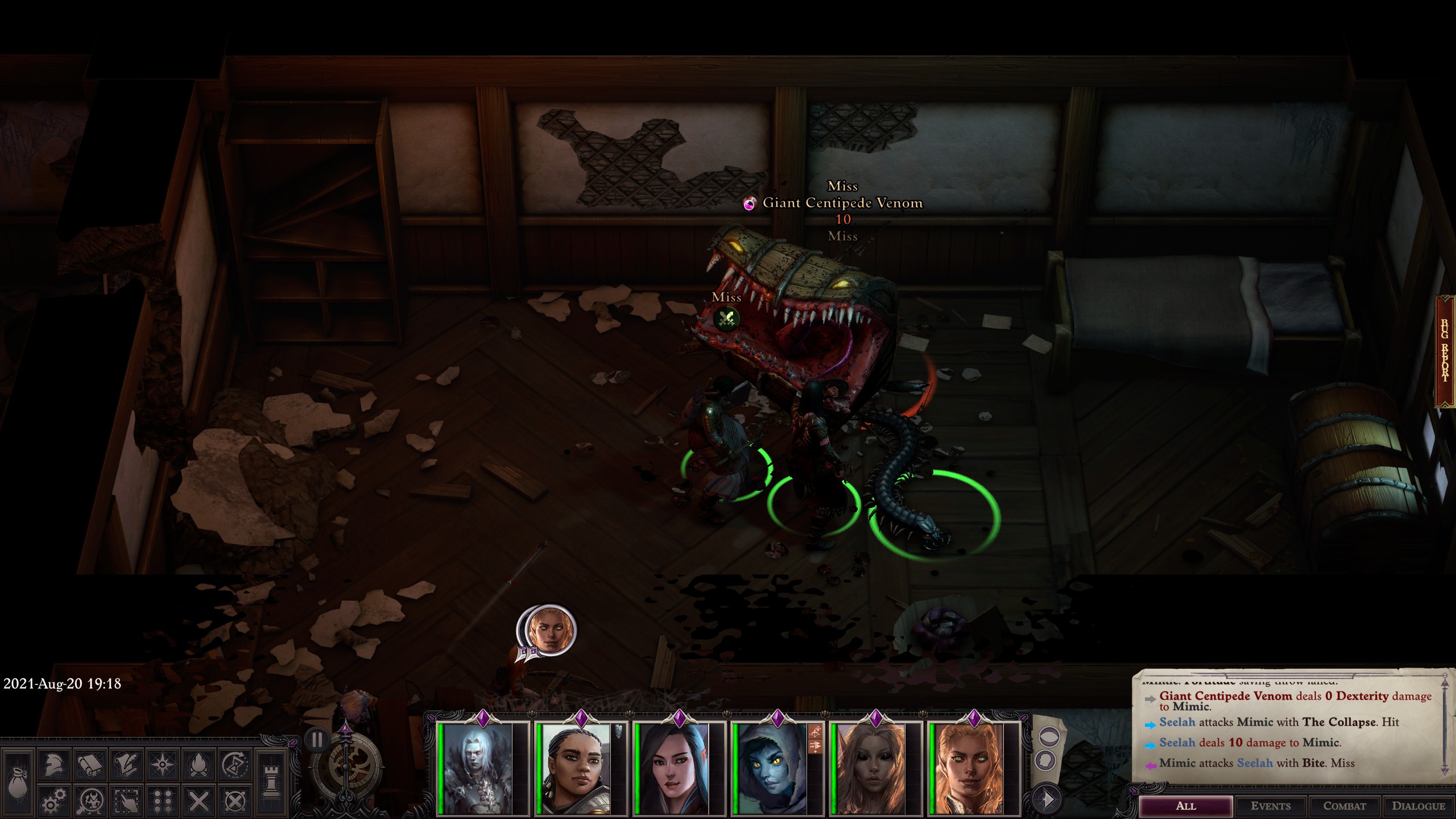
Guide: Wrath of the Righteous is full of interesting choices, only they are mostly mechanical. What abilities to pick. What mythic path to start walking down. Do you deficiency to be a dragon? An Angel Falls? And sometimes these decisions do intersect with the story, but typically only if with a small nod—a reference here, a comment there. There are, of course, BIG DECISIONS that are well mark-posted, which offer the well-nig hammy roleplaying possibilities, but IT's hard to build a character's persona based on just a few key events.
So if you're toying with grabbing Scout and want to create an evil bastard, just make sure you're OK with the same old tiresome options. I'd advise you to not make my mistake, though, and antimonopoly go with a to a greater extent traditional hero instead. The alignment choices will still seem arbitrary and non especially cohesive, but they'ray a tidy sum to a lesser extent jarring than the alternative.
Source: https://www.pcgamer.com/being-evil-sucks-in-pathfinder-wrath-of-the-righteous/
Posted by: hareouste1951.blogspot.com



0 Response to "Being evil sucks in Pathfinder: Wrath of the Righteous | PC Gamer - hareouste1951"
Post a Comment